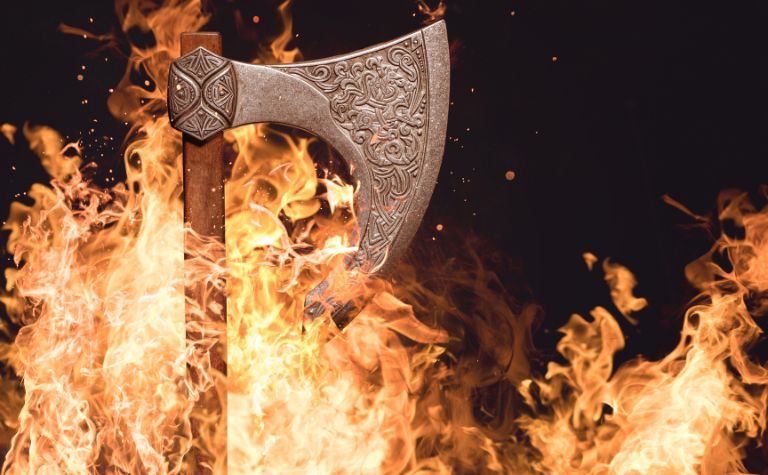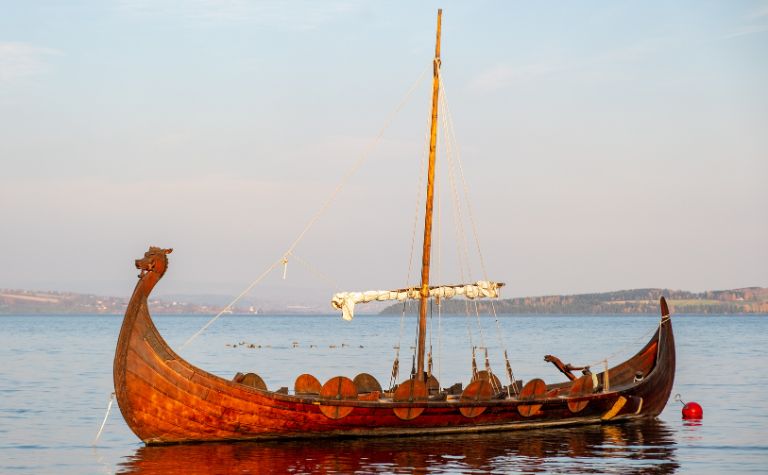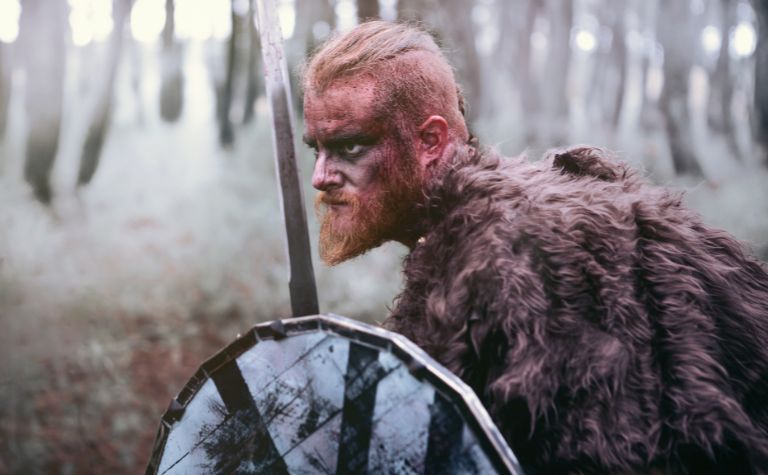In Norse mythology, a heavenly hall of the gods is renowned and revered by warriors and poets alike. This hall is known as Valhalla, the Hall of the Slain. But where is it?
Located in the mythical realm of Asgard, Valhalla serves as an afterlife destination for the bravest of warriors who’ve died a heroic death on the battlefield.
Perched high amid the celestial domain of Asgard, Valhalla is nestled within the grandeur of the cosmos, guarded by mighty walls and golden gates.
What does Valhalla look like? What is the meaning of Valhalla? Who are the Einherjar? What is the meaning of Ragnarok? What is Asgard in Norse mythology?
Keep reading to learn the answers to these questions and others.
Also, see What God Rules Over Valhalla? to learn more.

What Does Valhalla Look Like?
As one of the most majestic halls in the mythological cosmos, Norse mythology describes Valhalla as a grand spectacle of a fortress adorned with a roof of shields sparkling in golden colors against the vast, starry backdrop of the Norse cosmos.
The hall itself is of an incomprehensible scale, housing an astounding 540 doors, each vast enough to allow 800 warriors to march through them side by side.
Who are the Einherjar?
Within its walls, the chosen warriors known as Einherjar dwell. Their numbers swell daily as more and more heroes fall in battle, selected by Odin, the Allfather, and the valkyries, his divine maiden warriors.
The Einherjar spend their time in Valhalla preparing for the eventuality of Ragnarök, the prophesied end of the world.
Each day, they train relentlessly, engaging in epic battles to hone their skills, falling and rising again in a cycle of death and rebirth.
Their evenings are a stark contrast to their daytime trials.
They feast on the succulent meat of the enchanted boar Sæhrímnir, which is cooked each day and reborn each night to provide an endless food supply.
Their thirst is quenched by the limitless mead flowing from the goat Heidrun’s udders.
What is Ragnarok?
Ragnarök refers to a series of catastrophic events that result in the end of the world, followed by its rebirth.
These events include a brutal winter, a great battle where most gods like Odin, Thor, and Loki are destined to die, and the emergence of monsters such as Fenrir the wolf and the Midgard Serpent.
The fire giant Surtr will set the world ablaze, resulting in the destruction of the cosmos. However, this isn’t the absolute end.
Post-destruction, a new and more peaceful world is prophesied to emerge from the ashes.
Some gods will survive or be resurrected, and two humans, Líf and Lífþrasir, will repopulate the world.
Therefore, Ragnarök in Norse mythology signifies a cycle of death and rebirth.

What Is the Meaning of Valhalla?
The existence of Valhalla extends beyond just the tangible. It embodies an ideology, a testament to the values held in the highest esteem in Norse society – bravery, honor, and a warrior’s tenacity.
It is not simply an abode, but an ideal, a goal that every warrior aspires to reach, a symbol of eternal glory and honor.
Valhalla serves as a reminder of the heroic spirit and the perpetual cycle of life, death, and rebirth in Norse mythology.
Thus, Valhalla is more than just a location in Norse cosmology.
It is a potent symbol, an emblem of the Norse spirit, and a manifestation of the values and aspirations of its people.
The echoes of clashing weapons and the warmth of brotherly camaraderie in its grand hall are a testament to the grandeur of the warrior’s ultimate reward in Norse belief – an eternal place of honor in the realm of the gods.
What is the Norse spirit?
The “Norse spirit” isn’t a specific entity or concept but a term used broadly to describe certain attitudes, values, and behaviors that are often associated with the Norse gods and heroes.
These values include bravery, honor, resilience, loyalty, and a willingness to face one’s fate with courage.
For instance, the Norse gods and heroes were frequently portrayed as fearless in the face of adversity and willing to confront their destinies head-on, even when they knew the outcome might not be in their favor, as epitomized in their attitude towards the prophesied Ragnarök.
They believed in upholding their honor and fulfilling their duties, even in the face of danger or death.
Moreover, the idea of perseverance in the face of hardship is also central to the Norse spirit, embodied in the resilience of heroes and gods alike.
Stories like that of Thor’s relentless battles against the giants or Odin’s sacrifices for wisdom encapsulate this idea.
This means that the term “Norse spirit” essentially embodies the core values and principles of the Norse culture as depicted in their mythology: courage, honor, resilience, and a willingness to face the inevitability of fate.

What Is Asgard in Norse Mythology?
Asgard is one of the nine realms and is primarily known as the home of the Aesir, the primary group of gods.
This group includes major deities such as Odin, who is considered the chief of the Aesir, Thor, the god of thunder, and Frigg, Odin’s wife and the goddess of prophecy and wisdom, among others.
Asgard is often depicted as a majestic, fortified city located in the sky or on a higher plane of existence, inaccessible directly from the earth or Midgard, the realm where humans reside.
The rainbow bridge, Bifrost, serves as the connection between Midgard and Asgard, and Heimdall, the ever-vigilant god, guards this bridge against any potential threats.
Asgard is home to numerous well-known places within the Norse cosmos, including Valhalla, the hall where warriors slain in battle are taken, and Gladsheim, a grand hall where Odin presides over his high seat.
These locations play significant roles in various stories and sagas within Norse mythology.
In essence, Asgard, as per Norse mythology, is a celestial stronghold, the realm of gods, and a key locale for many important events and narratives.
